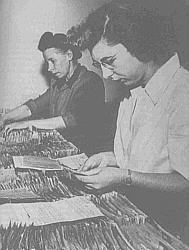|
|
Emigration
Every camp that closed out cut thousands of DP workers from the payrolls. The IRO staff had to scramble to recruit new batches of nurses-aids to replace the young DP girls who had emigrated to England as domestic workers. Trained warehousemen and truck drivers emigrated to Canada as lumberjacks; to Belgium as miners; to Australia as common laborers. The DP
Camps were immense pools of manpower representing every know skill.
Countries dipping into the pool had differing criteria for selection. Belgium offered to take twenty thousand coal miners. Wives and children had to wait three months in the camps until the men had proved themselves in the mines. They offered the men the same rights as Belgium miners - same compensations in case of injury, average earnings - five to seven dollars daily and up to fifteen dollars, if a man worked overtime on Sunday. Agreement on wives and children being brought forward after the three month period and age limit up to forty years. Those that were picked were trucked to the British Zone where they boarded trains headed for Belgium. An unsavory industrialist from Canada who required textile workers for his mill, made an appearance at the camp one day. Claiming to be on a mission of mercy and seeking young girls of "spotless moral character" he had chartered a plane from Frankfurt to Quebec and had only one afternoon to interview. He wanted only the girls - claiming families could not be considered due to housing shortages. The girls were to live in a dormitory "safe in the hands of a sisterhood. The pay was 'twenty cents an hour" he said, "They can earn as high as nine dollars and sixty cents a week, and will pay only six dollars to the sisters for their room and board weekly." One hundred 'hand-picked' girls arrived in Canada where they were dubbed "The Flying Virgins" by the local press. This experimental shipment ended with the first hundred….. Various other organizations stepped in to help the displaced get relocated. The Lutheran World Federation covered the Lutheran DP's; Church World Service - the Protestants and Orthodox; National Catholic Welfare Conference - the Roman Catholics; Hebrew Immigrant Aid Society and AJDC - the Jews. |
 According
to Kathryn Hulme's Book, "The Wild Place," the summer of 1947 was a
time of beginning "closeouts." The Army started handing back pieces
of confiscated property back to the Germans. The IRO was liquidating
the camps. Millions of dollars were being pared from the IRO budget
for the U.S. Zone. Small camps had to go - they were almost as costly
to run as the big camps that housed thousands more. The big resettlement
centers soon to be established would house many emigrant-recruiting
missions.
According
to Kathryn Hulme's Book, "The Wild Place," the summer of 1947 was a
time of beginning "closeouts." The Army started handing back pieces
of confiscated property back to the Germans. The IRO was liquidating
the camps. Millions of dollars were being pared from the IRO budget
for the U.S. Zone. Small camps had to go - they were almost as costly
to run as the big camps that housed thousands more. The big resettlement
centers soon to be established would house many emigrant-recruiting
missions.